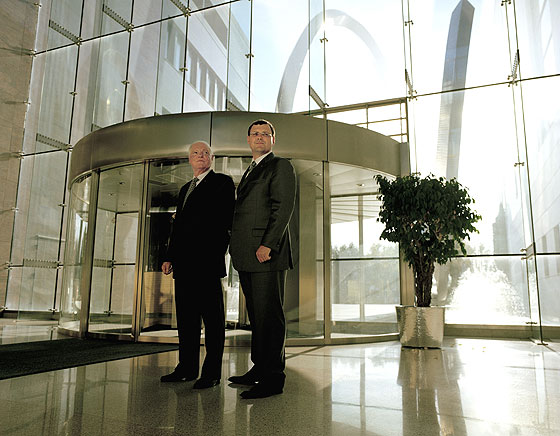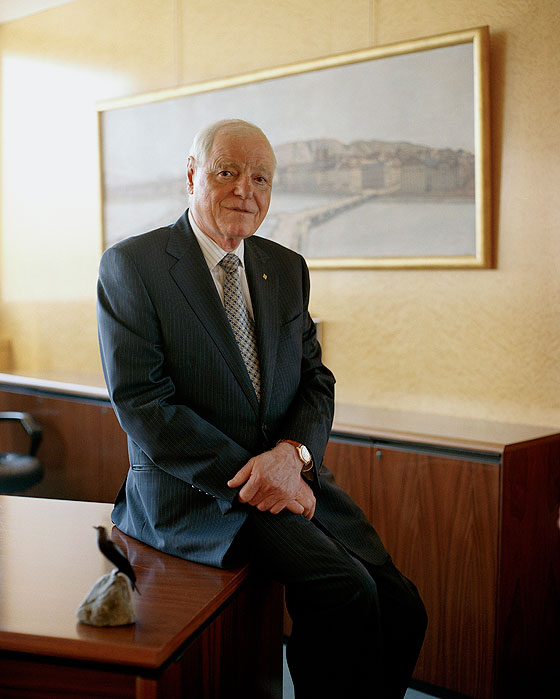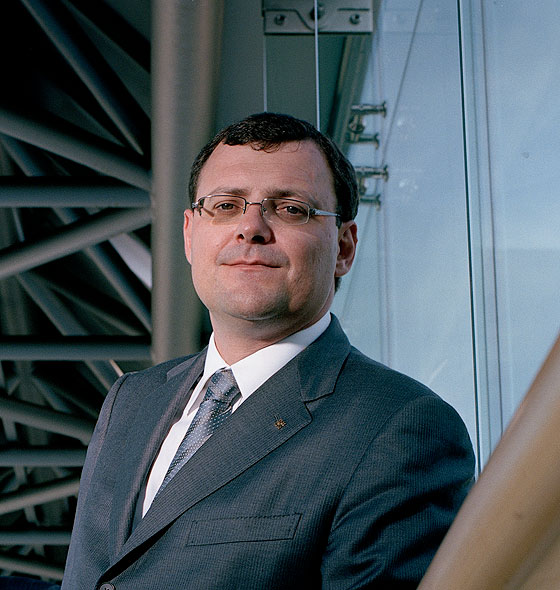Replica Patek Philippe’s Thierry and Philippe Stern
Geneva’s Stern family has owned and operated Patek Philippe for nearly 80 years. When it comes to making watches, they say, family matters. Scroll down to read WatchTime editor-in-chief Joe Thompson’s up-close-and-personal profile of Philippe and Thierry Stern from the WatchTime archives.
Visitors to Baselworld, the annual replica watches fair held in Switzerland, might have been surprised to see two boys, aged five and six, in the Patek Philippe booth this year. While it’s surprising to see youngsters at the show, it is not unusual to see these kids around Patek Philippe. The boys are sons of Patek Philippe CEO Thierry Stern and grandsons of chairman Philippe Stern. “They come once in a while to Patek Philippe. They came to the Basel fair, too. We have to start to train them very early, hoping for the best,” says Philippe Stern with a laugh.
What Stern senior is hoping for is that the boys or their two cousins — “I have four grandsons,” Stern says — will ultimately choose, like their father, grandfather, and great-grandfather before them, to enter the family business. “We want to keep this business in the family,” says Stern, who is the owner of Patek Philippe, the bluest of blue-chip watch companies, and who has made it clear that Thierry will succeed him.
A member of a fourth generation working in a family-owned watch company, as Thierry Stern is, is a rarity today. Indeed, in Swiss watch circles it is unique. The only parallels in the global watch industry are at Seiko Watch Corp. in Japan and Bulgari in Italy. CEOs Shinji Hattori at Seiko and Francesco Trapani at Bulgari are both great-grandsons of the firms’ founders. (Jasmine Audemars, chairman of the board of Audemars Piguet, is a great-granddaughter of co-founder Jules-Louis Audemars, but she had a career as a journalist and did not work within the Omega replica watch company. Similarly, AP board member Olivier Audemars, also a descendant of the founder, has a career outside the company.)
It will be nearly two decades before we know if a fifth generation of Sterns comes to Patek Philippe, but if one (or more) of them does, it would be unprecedented in an age when large, multi-billion-dollar groups dominate the watch landscape and increasingly gobble up smaller independent firms. Just this year, France’s LVMH, the world’s largest luxury group, bought independent Hublot; Switzerland’s Richemont Group took over independent Roger Dubuis SA; and the French group PPR (formerly Pinault-Printemps-Redoute), which owns Gucci and other fashion brands, took a 23 percent share in the holding company that owns independent Girard-Perregaux, with a larger stake expected to come later. So it goes and will continue to go.
With independent, family-run firms vanishing from the Swiss watch scene, Patek Philippe has taken to highlighting the multi-generational, family-run nature of the firm that Stern père et fils consider key to its identity and success. Last year in Asia, and earlier this year in the United States, the company held an exhibition of historical and contemporary Patek Philippe timepieces entitled, not coincidentally, “The Values of a Family Watch Company.” In a welcome letter to guests signed by the two Sterns, they stated, “Since 1839, it has been Patek Philippe’s uninterrupted mission to maintain the traditional art of Geneva watchmaking while continuing to strive for innovation. As the last privately owned, independent watch manufacturer based in Geneva, we are determined to carry on these values for generations to come.”
Not long ago, family-owned businesses run by grandsons and great-grandsons of the founder or owner were standard in the Swiss watch industry. In the 1960s, Jaeger-LeCoultre, Audemars Piguet, Piaget, Heuer, and Breitling, to name a few, were owned and run by the founding families. “When I was a kid, we used to see many family businesses,” Philippe Stern says. “Suddenly they all disappeared, more or less at the same time, between 1975 to 1985.”
That was the period of Switzerland’s quartz crisis, when electronic quartz technology, advanced by Japanese producers Seiko, Citizen and Casio, virtually eliminated mechanical watches from the market. “Family businesses got weaker and weaker,” Stern says. “They didn’t have the will or the money to evolve. Big groups came into the picture. Today the family business is really unusual.”
Moreover, because so many independent firms changed hands in the quartz and post-quartz era, the roots of many of the remaining family-owned Swiss watch companies are not deep, rarely extending beyond the second generation. Prominent independent firms such as Chopard, Breitling, Girard-Perregaux/JeanRichard, Raymond Weil and Corum all have second-generation family members in charge or in prominent management positions.
So how have the Sterns managed to keep Patek Philippe all in the family for three-quarters of a century? Part of it is not forcing the issue with the next generation; another part is making them start at the bottom.
The Stern family acquired Patek Philippe during that other great Swiss watch crisis of the 20th century, the Great Depression. The first generation of Sterns at Patek, the brothers Charles and Jean Stern, owned a watch dial factory in Geneva, Fabrique de Cadrans Stern Frères, which supplied dials to Patek Philippe. In 1932, Patek Philippe, like many Swiss watch companies, was in desperate need of capital. The Stern brothers came to the firm’s rescue, acquiring a majority of its shares. They immediately made two momentous decisions. First, they realized they needed a strong watch executive to help run the enterprise. (The Sterns’ expertise was in dial manufacturing; their parents were enamel painters by profession.) So they tapped Jean Pfister, the highly respected head of the Geneva office of Tavannes Watch Co., to head operations.
Secondly, the brothers and Pfister decided that Patek Philippe would from then on make its own ébauches (movement blanks) rather than relying on LeCoultre (soon to become Jaeger-LeCoultre) in the Vallée de Joux.
The Stern era got off to an illustrious start. In 1933, Patek Philippe completed and delivered its most famous watch, the Graves Supercomplication, made for the American watch collector Henry Graves, Jr. Its 24 complications made it the most complicated watch in the world until 1989, when the firm’s Caliber 89 surpassed it. (The double-faced Graves watch sold for $11 million at a Sotheby’s auction in 1999, by far the highest price ever paid for a watch at auction.)
Henri Stern, Charles’s son, was 21 when the family took over Patek Philippe. At that time he went to work at the Stern Frères dial factory, where, in addition to assisting his father, he became an engraver. His desire, however, was to join the watch company. He lobbied his father and uncle to let him move over to Patek Philippe. Finally, in 1935, they did. That year, Charles Stern became chairman of Patek and Henri served as his assistant. In 1937, Charles sent him to the United States to learn the U.S. market, which had long been a Patek Philippe stronghold. (Firm co-founder Count Antoine Norbert de Patek himself paved the way in the United States. He called on Tiffany founder Charles Lewis Tiffany in New York in 1854 and got the business.) In 1942, Henri set up the Henri Stern Watch Agency in New York; it remains the name of the U.S. subsidiary to this day. Charles Stern died in 1944 and Pfister resigned in 1946. Henri Stern then spent more and more time in Geneva, taking over as president of the firm in 1958.
That same year his son Philippe turned 21. “My father never pressured me to go into Patek,” Philippe Stern recalls. “I first started working in Germany in the computer business.” Soon, though, he decided to get involved in the family business. He joined Patek in 1964. His father immediately sent him to the United States. He started at the bottom of the Henri Stern Watch Agency, learning how to attach straps to watches. Also starting out at HSWA at that time was a youngster named Hank Edelman. Both men have spent their entire careers with the firm; Edelman is now the chairman of HSWA. Today the two laugh recalling the countless hours they spent together in a little room attaching straps to watches.
Philippe Stern returned to Switzerland in late 1966 and began learning the rest of the watch business. “Little by little, I just thought that this is something for me,” he says. “I really liked what I did. I was proud of it. After that, I never thought of doing anything else.” In 1977, in the thick of the quartz crisis, Philippe Stern succeeded his father as president of the firm.
Thierry Stern was seven years old when his father began running the company. (Henri Stern moved up to the position of chairman.) “I was very lucky,” his father says. “Thierry always wanted to come to Patek. Even when he was a small boy, he said, ‘I want to work at Patek.’”
“I never really was excited about doing anything else,” Thierry Stern says. “I was always involved. It’s like your own family. You feel that it’s something you have to continue. There are so many different activities at Patek; there was always something I wanted to do. You never get bored.” Patek Philippe was his first job out of university in 1992. He spent two years in New York at HSWA, working with Hank Edelman, learning the U.S. market just as his father and grandfather had done. He also lived in Germany before returning to Patek Philippe headquarters in Geneva.
Learning the business from the bottom up and the product from inside out is one secret of the family’s success, the Sterns say, and a strength of a family business. “We didn’t start with just learning at school and concentrating on the financial side,” says Thierry Stern. “We all started inside the product, by learning how you produce a nice product. For me, it’s the major difference.”
Says Philippe Stern, “We know about watchmaking. We are surprised sometimes to meet a president or a big director of a factory and they don’t really know what a watch is. They know a lot about perfume, about champagne, maybe they are very good managers, but they don’t know much about watches, really.”
Stern senior continues: “For me, the most important thing for Patek is the credibility of the brand. Today in our business, and in other businesses, too, people are talking to customers and retailers so much and they do exactly the contrary [of what they say]. I cannot go out and tell a fantastic story if it is not right. Some people may have to do that for marketing purposes or to make the brand look more important or nicer. But we have to be a little more discreet. This is something very important: to be loyal to your customers and retailers. I believe you do this rather easily if you believe it’s your business, in the family.”
One challenge for the Sterns is to maintain the family business approach in a firm that has enjoyed exceptional growth in recent years. “That’s getting difficult,” Thierry Stern says. “There used to be 150 people in the company. Now you must add one more zero.” Patek Philippe employs about 1,600 people in total, 1,300 of them in Geneva. “It’s a large organization today,” says Philippe Stern. Annual watch production is about 42,000 units, Stern senior says, “about 30,000 mechanical watches and 12,000 quartz watches, mainly ladies’ Twenty-4 pieces.” But Stern notes, “We produce many more parts today since we are producing more and more complicated pieces. Our normal watch movement has 160 parts. The annual calendar [movement] has 300 parts; our perpetual calendar has 325. So, actually, we are producing maybe four times more parts than five years ago. We need more people, more machines and we produce more parts but finally it’s still one watch.”
Patek Philippe is, of course, atop everyone’s list of successful independent watch firms and is thus a luscious takeover target. On the subject of whether the family would ever sell the company, Stern recalls that when he built the new manufacture in Plan-les-Ouates in 1996, there were rumors that he wanted to sell the firm. The talk was that he opened the new factory to fatten the asking price. “Once in a while, you always have some smart people saying, ‘Well, Patek is not going to remain a family business, it’s going to be sold for I don’t know how many billions.’” (“I am asking for 20,” Thierry whispers in an aside, teasing his father.) But both Sterns make it clear that a sale is unthinkable. “It’s part of your family, really,” Philippe Stern says, “and if you sell it, you would feel completely alone.”


